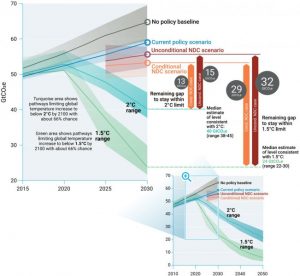In the lead-up to the 2015 Conference of Paris, 186 countries, representing over 95% of global greenhouse gas emissions, submitted Nationally Determined Contributions (NDCs). The NDCs are documents that outline national goals for greenhouse gas emission reductions and identify financial needs for achieving these reductions and responding to climate change impacts.

Global greenhouse emissions under different scenarios and the emissions gap in 2030 (Source: United Nations Environment Program, 2018, p. 9)
An analysis in WIREs Climate Change examines both the NDCs and existing studies on these important documents, to assess the total impact of emission reduction commitments and how these commitments are made by nations across sectors such as agriculture and forestry.
The NDCs, however, are more than just goal setting reports; they are important, discursive documents that are argued over, negotiated, and in constant revision. This discourse is the language that shapes the views of the world, revealing how different players present issues surrounding climate change.
To examine the discourses embedded in the NDCs, the current WIREs study analyses the NDCs from the 19 founding nations of the Climate Vulnerable Forum, an important coalition of developing countries and the top ten greenhouse gas emitters.
The WIREs review highlights that 1) the NDC emission reduction commitments are inadequate for limiting global warming to 2°C (see figure), 2) the mitigation strategies countries have include in their NDC are uncertain due to a lack of monitoring and accountability, and 3) many countries overly rely on policies focused on mitigation from forests and renewable energy to meet emission reduction goals.
This analysis highlights the stark contrasts in NDC discourses between nations in the Global North-South, as well as between historical green house emitters such as the U.S. and European Union, as well as emerging economies such as India and China, reflecting deeper debates regarding justice and equity between nations within the United Nations Framework Convention on Climate Change (UNFCCC) climate change negotiations.

















